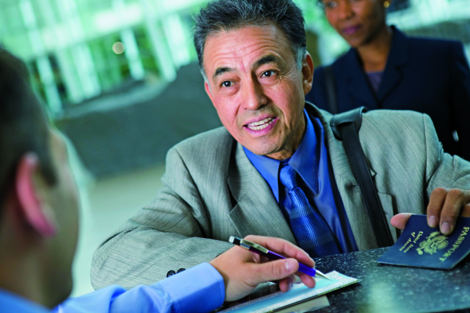Passport: Check. Tickets: Check. Bags: Check. Laptop with the all-important PowerPoint presentation: Check. You’ve even brought along that novel you’ve been trying to finish. But when you arrive at the destination the night before the conference that could prove to be a pivotal point in your career, you discover that your paperwork is not in order and you’re refused entry. No amount of humiliating pleading with immigration officials will work, and you’re forced to turn around and head home.
That could take some explaining. Not least to your boss.

It may seem a fanciful tale, but situations such as this occur all too often. Usually, cases such as this may be down to a simple, and perhaps unforgivable lack of preparation – most visa requirements are, after all, readily available and quite clearly stated online. However, it may be due to something that the traveller has forgotten about entirely. Think back to your youth. Did some student prank, albeit a harmless one, earn you a criminal record? That may be enough to deny you entry if comprehensive background checks are done, but again, a little research will determine if this is the case.
Magdalene Tennant, a Hong Kong-based partner at Fragomen, the world's largest global immigration law firm and one which represents 60 per cent of Fortune 100 companies, says delegates may be turned back for several reasons, even if they have the correct papers.
“Each jurisdiction has its own entry policy. If the border control officers suspect that an individual is not a bona fide visitor, he/she will very likely be turned away irrespective of whether the individual has a valid entry visa or is a visa-exempt national," says Tennant.
It’s also worth noting that the goalposts can move – visa requirements may change overnight if politics dictate, and visa requirements are nothing if not political. This is well illustrated by the way in which some former colonies financially penalise those coming from the former colonial power, whereas an obscure trade deal struck 30 years ago between your nation and that which you’re visiting may mean you’re welcomed with open arms.
Your nationality is, in fact, the most important aspect when it comes to visa regulations. Citizens of countries such as the United Kingdom, for instance, will gain automatic entry to many countries, while those from poorer or developing nations will often need to apply for visas ahead of their visit. But situations change. India, for example, has plans to extend its tourist visa on arrival (TVOA) scheme beyond the countries currently included (in Asia that’s Japan, Singapore, the Philippines, Cambodia, Laos, Vietnam, Burma and Indonesia). This is not only important to the nation’s tourism sector, but also in easing access for foreign businesspeople keen to get on board India’s booming economy. Do bear in mind that governments indulge in the game of tit for tat. Travel restrictions imposed by one administration on the citizens of another will likely result in copycat measures.
Luther Low, director of meetings and events at MCI in Hong Kong, says it's vital that delegates engage a professional event management company. Be aware, too, of the intricacies of double or multiple-entry visas. Check the length of stay allowed for each sector, and the time allowed between visits.
Tennant adds, “Conference organisers should be aware of the nationality of the key speakers and ensure that they have the correct visas upon entry. Conference organisers should also refrain from inviting speakers who may have difficulties in obtaining a visa or the long processing time that it will take to obtain an appropriate visa. We recommend that all relevant information and documents must be in order at the time of application submission. And if there is an urgent need to expedite the process, e.g., a situation where public interest is affected, the sponsoring company should approach the relevant government authority explaining the situation and providing reasons requesting for expediting applications.”
HASSLE-FREE BORDERS
• Do your homework. Resist the temptation to go straight to a bargain-bucket visa shop. Instead, check the country in question’s official website for up-to-date visa requirements.
• Once you’ve established what’s required, check with a trusted travel agent to see if they can process the visa for you, saving you time that would be wasted
in queues.
• Make sure your passport isn’t about to expire. Some administrations require six months or more of validity before issuing a visa.
• Ensure that you have room in your passport. Several countries, such as China and Burma, require a full page for their visas.
• Carry a few recent passport photographs with you; they can be useful for a variety of application forms.
• Carry a photocopy of your passport’s personal information page (and relevant visas) in a different bag to that of your passport. It’s also a good idea to save a copy on-line, so that you can gain access to it in the event of loss.
• Get travel insurance. This is a necessity, not a luxury. Check the small print to see what it offers in various situations.
CONTACTS
Fragomen
Global immigration law firm, advising on both short and long-term issues.
www.fragomen.com
Feod Group
Legal group with strong immigration division.
http://feodgroup.com
List of BNO passport visa-free
countries
www.british-consulate.org
Hong Kong SAR Government’s foreign travel advisory service
www.sb.gov.hk/eng/ota
Singapore’s Ministry of Foreign Affairs, for Singaporean nationals
www.mfa.gov.sg


